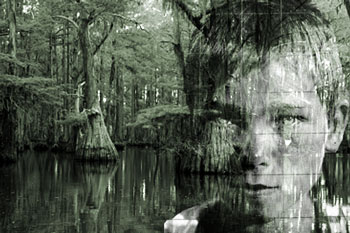Page 1 Page 2 Page 3 Page 4 Page 5

Three days later, Uncle Zeb and I row up to the springs where the river starts, and we pull the skiff ashore in the woods, like always, and walk up the path, carrying two sacks of smoked mullets. When we get to Route 19, we stand there, getting used to all those metal cars and trucks roaring, and their stink. Then we hike down the grass on the side of the highway, Uncle Zeb shouldering one sack of mullets and me shouldering the smaller one. We get to the flea market and open our stall. I go buy a bag of ice. Then we lay out our mullets on the ice in the trays and wait.
Uncle Zeb finds a pamphlet lying on the ground, walked on, and has me read it, which I mostly do, except one word snags me, and I get swatted for that. Then we sell some mullets, and Uncle Zeb puts the money in his little coonskin sack tied to his belt. I’m watching all those Outsiders milling through the aisles, thinking how I’m an Outsider here, and I try to imagine how their life is, which I can do a little, having seen their houses, the ones you see from Route 19, set back on those little streets. I think about a house, about schooling, and whether they teach more than letters and numbers and gator snagging, but what would that be? But I think, how could I ever live without kin around, and the tribes and clans? It makes me feel hollow and weak, just thinking of such a thing. Except I wonder….
“Ebenezer!”
It’s that red-haired lady from the boat. She has a canvas bag, with a manatee picture on it, and I see she’s been walking along the stalls, buying this and that. Now she’s staring at me, as if she’d found a hurt fawn. And I know she wouldn’t kill that fawn for eating, but try to heal it.
“No,” I say, meaning no, I’m not hurt, but mainly, no, don’t talk to me.
But it’s too late, because Uncle Zeb already is looking from her to me, figuring I talked to this Outsider, and even gave her my out-loud name. I see he’s getting mad. But he doesn’t know they may have followed me to our island, so I’m not so scared yet.
Ebenezer, she says, how many of you children are out on those islands, not going to school? I see Uncle Zeb’s eyes firing up, so I just look down and shrug. I’m going to get a beating, that’s sure.
She says to Uncle Zeb, what’s your name? And he just glares at her, because he knows this is trouble.
She says to him, are you the man Zeb? He says nothing and I say nothing, but she knows, somehow.
She says, do you know what child abuse is? Do you understand statutory rape?
He’s glaring at her. And she’s glaring at him. And he doesn’t understand her words, which I don’t either, except that she’s accusing, and brewing big trouble.
She gets out a little telephone from her pocket and opens its hatch and pokes at it with her finger, saying I’m sorry, to Uncle Zeb, but I’m legally bound to report all this to the sheriff’s office. But she never finishes dialing — Uncle Zeb, he swats that telephone out of her hand, onto the ground, and grabs my shirt in back, and starts us walking fast right out of that flea market altogether, to Route 19, leaving all our mullets there for anyone to take off the ice tray, but he keeps us going fast.
When we get to the highway there’s a car waiting, with writing on the side: “Sheriff’s Department.” Then its door opens and the deputy is there, with a revolver on his hip, and a broad-brimmed hat on, and a tan uniform too small for him, and he tells Uncle Zeb, come along now, to answer questions. Then he tells Uncle Zeb to put his hands behind his back, which Uncle Zeb does, and he snaps on handcuffs. Uncle Zeb tries to move his arms and can’t, and his eyes go wide and afire, and he kicks that deputy between the legs, and the deputy goes down on his knees and Uncle Zeb kicks his head, and then again, and that deputy just lies there.
“You come,” Uncle Zeb tells me, like a snarl, and I know I’m going to get it really bad.
So down that highway we go, along the grassy side, Uncle Zeb ahead with his arms handcuffed behind, walking fast and angry, his yellow beard whipping in the wind from the cars whizzing by, faces in the windows looking, looking, and me coming along behind as fast as I can. We’re not talking, all the way up that road, Uncle Zeb not looking at those people in the cars looking at us, just glaring straight ahead, with his hands cuffed behind his back. And when we get to the woods and get into the skiff, I row us, and Uncle Zeb is still fierce, so I don’t talk, hoping they don’t beat me too bad.

